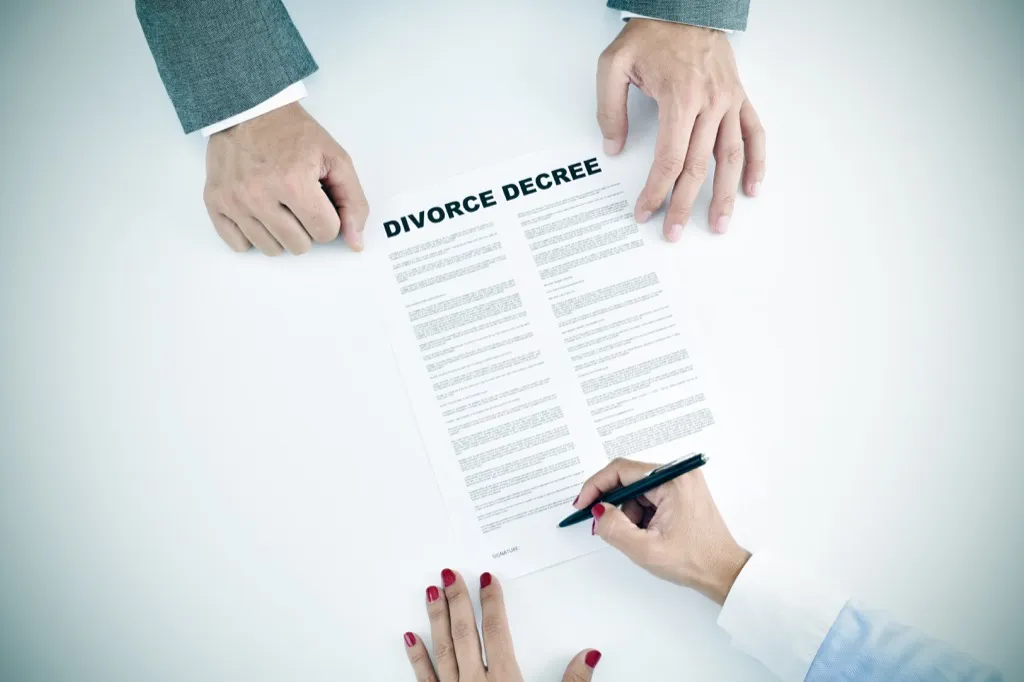20 Things You Should Know About Remarriage, According to Experts

So, you’re thinking about tying the knot for a second time (or third or fourth, we don’t judge). Go you! Getting remarried is both exciting and challenging, and there’s a whole lot to consider. But the number one thing to keep in mind is this: Your next marriage will be nothing like your previous one. From bureaucratic shifts to emotional ones, we’ve gathered the definitive list of everything you need to know before you say “I do.” The following therapists, counselors, and remarried people have tons of advice for remarriage that can help you feel more prepared.
1
You’ll do a lot of analyzing.

Because this isn’t your first rodeo, you’ll find yourself analyzing your last marriage—a lot. But that’s not necessarily a bad thing. Amy Sherman, a licensed mental health counselor in Boca Raton, Florida, says you need to ask yourself: “What are the red flags that got you out of the marriage in the first place?” By dedicating some serious thought to the matter, you’ll be able to catch them and find out what you do and don’t want in a new spouse.
2
You might be remarrying for the wrong reasons.

Sherman tells her clients to ask themselves one important question: “How desperate are you to be in a relationship again?” Many people who get remarried realize they’re entering into a new marriage simply because they don’t like the idea of being alone and have codependent tendencies. Sherman says to make sure you’re remarrying someone to “enhance your life, as opposed to fill you up.”
3
You might end up marrying the same type of person.

Humans are creatures of habit, and it’s easy to stay safely ensconced in a comfort zone—and the same goes for marriage. So if you’re thinking about tying the knot again, it’s worth doing a bit of self-analysis to see if your new spouse seems just a little too familiar. According to Sherman, it’s possible you might be marrying someone similar to your ex, which clearly wasn’t the best match.
4
You’ll need to work with your ex—or your spouse’s ex—for the sake of any kids involved.

Whether or not you have children of your own, you might be looking at becoming a step-parent once you’re remarried—and that means heaping more responsibilities on to your plate. “You want to find out what the children like, what they’re interested in, so that you could align yourself with that and have a common thread with them,” says Sherman. She suggests working with the ex-spouse or other parent to make sure you can be the best step-parent possible.
5
You might long for your original family dynamic.

If you blend families in a second marriage, it can be very challenging. No matter how amazing the person you’re marrying is, they’ll never be able to replace your kids’ other parent. “You really miss the intimacy of sharing those feelings and conversations with the other natural parent,” says Lindy Zerboni, a remarried woman from California. “At least I did.”
6
Your new partner might call you by the wrong name.

Yes, it’s a terrifying prospect, but there’s always the chance your new spouse will call you by their former spouse’s name. (And hey, you might slip up, too!) Zerboni even experienced it firsthand: “It happened once when I was being introduced to a V.I.P. in my husband’s business…because of his nerves!” Whether it’s in a public setting or a private one, it’s not ideal. But you have to remember that your spouse is most likely doing it absentmindedly.
7
You’ll have a new level of respect for marriage.

Dr. Charles and Elizabeth Schmitz, the authors of In Marriage Simple Things Matter, note that in a second marriage, spouses tend to have more respect for each other, their individuality, and their different opinions compared to previous marriages. “This element of respect just permeates these relationships,” says Charles, citing one particular couple he and his wife worked with who were both on their third marriages. “Third time around, they finally got it right.”
8
Tactile communication will be harder.

Tactile communication—i.e., touch—can be harder to maintain in a second or third marriage. Elizabeth Schmitz explains that remarried couples will have to work more at tactile communication because they’re at a different stage of life. “You’re not newlyweds in a first-time marriage with bright eyes and bushy tails,” she says. “You have to make a concerted effort to take time to show the loving touch when you get older.”
9
You’ll put in more effort.

People tend to put more effort into a second marriage because they don’t want to fail at marriage again. As a result, Linda Charnes, a licensed marriage and family therapist in New York, says that people often work harder and try to fix things more when they’re remarried.
10
You’ll naturally compare things to your last marriage.

Don’t think that once you’re remarried, everything from your previous marriage is erased from your memory. In fact, you might catch yourself reminiscing about the past and comparing it to your new marriage. “It’s natural,” says Charnes. “People grow and change and you don’t want to completely discard every element of the first marriage.” After all, if you don’t think about it, how can you avoid the same mistakes from your previous marriage in your new one?
11
You might feel letdown.

When you get remarried, there’s always an expectation that the new relationship will be incomparably better. But that’s not a guarantee. “People have unrealistic ideas that a change of scene is going to make an enormous change,” says Charnes. Rather than thinking a new marriage is going to be a night-and-day switch for your overall happiness, think of it like more as a gradual change—and embrace any new happiness that comes your way.
12
Your new spouse might feel jealous.

According to Charnes, sometimes your new spouse can feel like they’re there to “save the day.” But when a previous marriage wasn’t that bad, there can be some jealousy of the ex-spouse in your new marriage. It’s a normal human emotion, but make sure you deal with it through open and honest communication, she says.
13
Your families might be even more overbearing.

When you’re getting remarried, you’re joining yet another family. However, after previous marriages didn’t work out, your family or your spouse’s family might butt in more than they did with an earlier marriage in an attempt to ensure this new marriage doesn’t end like the last.
“The family members may get too involved in the relationship and the spouse feels like they’re getting ganged up on,” says therapist Courtney Geter, LMFP, CSP, who’s based in Decatur, Georgia. And that may be frustrating, but here are two bits of remarriage advice: 1) Don’t forget to set your boundaries with your own parents as well as your in-laws, and 2) Your new spouse is worth putting up with the family drama.
14
Your sex life will change.

Geter compares sexual connections to zebras: Each has their own stripes. Your new spouse’s sexual interests and preferences aren’t going to match those of your previous spouse. “You’re going to create a new routine, new life with a new partner and that would also include sex,” says Geter. Understand that you’re going to have a new personality in the bedroom, and your sexual tendencies will likely change when you remarry.
15
The odds are against you.

According the U.S. Census Bureau, anywhere from 67 to 80 percent of second marriages end in divorce. The odds might not be in your favor, but following this remarriage advice is a great place to start.
16
You should consider counseling.

If marriage counseling wasn’t a factor in your previous marriage, don’t be surprised if your next spouse brings it up—and early on, too. “From a therapist’s point of view, the issue isn’t situational,” says Charnes. “You have to resolve internal conflicts or they’re going to come out in a second or third marriage.”
17
You’re more likely to want a prenup.

With first marriages, the “I do” generally comes with a “forever”—meaning a prenup is viewed as, at best, unnecessary, and, at worst, insulting. But if you’re getting remarried, you know that “I do” doesn’t always mean forever—and that a prenup might be a good idea. Plus, “if people are older and have accumulated more and are further along in life, there might be more that they have to lose,” says Charnes.
18
Your state of residency might have a waiting period for remarriage.

Before getting remarried, be sure to check the Social Security Administration to see if your state has a required waiting period. Not all states do, but some have fairly strict laws on the books. For example, in Massachusetts, you have to wait up to 120 days after getting divorced before you can remarry.
19
You’ll want to discuss any name changes early on.

It’s not uncommon for people to keep the name of their previous spouse even after a divorce. After all, it’s difficult to change your license, Social Security card, passport, bank accounts, and all that jazz again. So, if you’re in a serious new relationship, you need to have that conversation with your partner before getting remarried.
Rebecca Wright, a remarried woman from Illinois, is an established lawyer and had difficulty adjusting professionally to a new name after her first marriage. Now, she’s remarried. But before tying the knot for a second time, she had to talk to her husband: Changing her name again could’ve been an issue for her career, so she stuck with her first married name.
No matter what you choose to do about your name, it’s not a conversation you should gloss over.
20
And you shouldn’t rush the process.

When you’ve faced a divorce, it can take years to heal from it. So, yes, you might’ve found your new love, but there’s no need to rush right into getting remarried. Rachel Bledsoe from Tennessee wrote in an article for Good Housekeeping that she turned down her second husband’s first proposal because she still needed time to heal from her first marriage. There are also times when you see that your ex-spouse is remarrying and you might feel pressure to do the same. Remember that everyone is on their own timeline, so instead of rushing, think about what’s best for you.